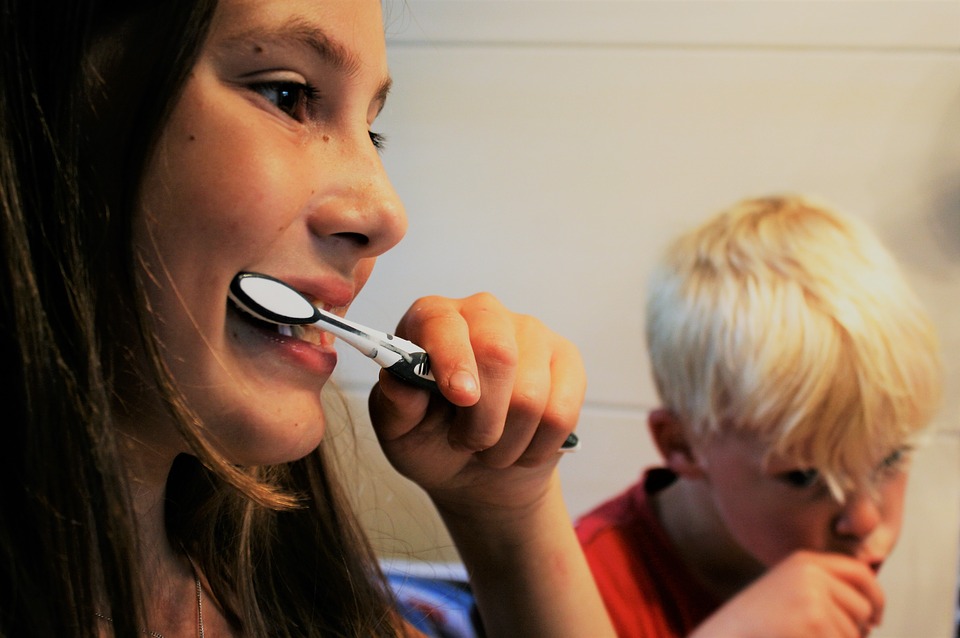Dentures
Looking in to dentures? Transitioning from natural teeth to a denture is a big life change. See what you should consider and some of your options as you start exploring the world of dentures.

When teeth are removed for any reason we will talk to you about making sure they are replaced. Reasons to replace missing teeth include looks, function, bone loss, and shifting of the remaining natural teeth. If all your teeth are gone you most likely are a candidate for a full denture (or plate). If you still have some natural teeth remaining with limited spaces that need to be filled, there is an option of a partial denture. While dentures can do a great job to improve esthetics, they do come with their limitations in regards to function. As you look into your options, Dr. Baldwin can thoroughly review your expectations and pair those expectations to the the ideal treatment for your situation.
Full dentures usually consist of replacement teeth attached to pink or gum-colored acrylic bases. The top denture base will cover the palate or roof of the mouth. With partial dentures there is normally a metal substructure with clasps that will hold onto the remaining teeth to help keep the partial denture from moving as much. Another option for partial dentures is to use precision attachments instead of the metal clasps to hold in a partial denture. Precision attachments are generally more esthetic than metal clasps because they are nearly invisible. Crowns on your natural teeth may improve the fit and retention of a partial denture and they are usually required with precision attachments.
Moving from your natural teeth into a denture is a big life change! Implants are a great way to help the transition into a denture be less dramatic. Implant retained and implant supported dentures keep you chewing more of the foods you are familiar with, while decreasing the limitations that inherently come with a denture. The more implants you have the more stable and retentive the denture will be. You can vary from 2 implants to 5 or more per arch. Removable implant dentures allow you to remove the prosthesis daily to clean and allow the tissues to rest at night but come with the benefit of greater retention and stability during the day and while eating. Hybrid dentures sit on top of 4-6 implants and are completely fixed to the implants. In other words they do not come in and out, they are mounted to the implants and stay in place. Hybrid dentures are very esthetic and allow you to function and chew more similarly to your natural teeth than any other denture prosthesis, but they still come with limitations.
Every denture and every patient are different, some patients have more limitations of what they can and can’t do with their denture. If you are interested or have questions please stop in to see Dr. Baldwin for a consultation about what options are best for you.
How do you wear a removable denture?
Dentures are worn daily, full dentures at times require aids to help make them more retentive and stable. The denture is placed in the morning and removed at night to allow the tissues in the mouth time to relax. Dentures can be worn while eating but normally will need to be taken out sometime after eating to rinse out any debris caught underneath the denture. Your denture should fit into place with relative ease. Never force your denture into position by biting down. This could bend or break the clasps on partial dentures or cause you to scrape your gum tissues underneath your denture.
How long will it take to get used to wearing a denture?
For the first few weeks, your denture will feel awkward or bulky. However, your mouth will eventually become accustomed to wearing it. Eating and speaking with the denture will require practice! We encourage our patients to take baby steps as they start out with a new denture. The first few weeks following delivery of your new denture we plan to see you for several adjustments. It is very normal to need several adjustments to get the fit of your denture to be spot-on.
How long should I wear the denture?
At first we have you wear it as much as you can. This will help identify any spots that need adjusting. After several adjustments, we will have you wear it during the day and take it out at night.
Will it be difficult to eat with a denture?
Eating with a denture is different from eating with natural teeth. Initially it will seem like a chore, eventually you will become accustomed to eating with the dentures. After you get your first denture we have you start off slowly with soft foods that are cut into small pieces. Chew on both sides of the mouth at the same time to keep even pressure across the denture. Slowly you can add new foods and textures to your diet. Avoid foods that are extremely sticky or hard. Over time you will learn which foods you can eat and which foods will cause trouble with your denture.
Will the denture change how I speak?
During the design process of the denture Dr. Baldwin can custom design the position of the teeth to help phonetics and pronunciation be most ideal. It can be difficult to speak clearly when you are missing teeth. So, wearing a denture may actually help you be better understood. If you find it difficult to pronounce certain words with your new denture, you can practice reading out loud. Repeat the words that give you trouble and with time, you will become accustomed to speaking normally with your denture. You can also see if small adjustments are possible by coming in for regular checkups.
How do I take care of my denture?
Any time that your denture is out of your mouth handle it with care. It is a great idea to stand over the sink or move off the tile when removing the denture as it may fall, and hard floors are not soft landings. Brush it as often as you would your natural teeth, but don’t ever use toothpaste as it has small abrasives that can make micro scratches in your denture that will then harbor plaque and further stain your denture. Use a denture brush (can be found next to all your denture care products at the store) for brushing your denture, the bristles are stiffer and better suited to clean all the angles and surfaces of your denture. Using hand soap or a mild dish soap will work if you think you need to have some foaming action.
There are also denture cleaners that work great for removing stains and help your denture to stay fresh. A lot of these cleaners come in tablet form, you drop one tablet into your denture bath/case and allow it to sit overnight. Partial dentures that have metal can potentially become tarnished from soaking in these solutions, there are specific cleaners for partial dentures that will keep this from happening.
When your denture is not in your mouth it is important to keep it moist. Place the denture in your denture bath/case with denture solution or water. The denture does not have to be completely submerged but should not be left dry either.
Will my denture need adjusting?
When you first get your denture it will need a few adjustments to get the fit just right. Over time your mouth naturally changes which may require more adjustments for the denture. You will know that you need an adjustment because you will develop sores or it will start to seem loose. If the changes in your mouth cause the denture to fit less ideally, we may suggest re-fitting the inside of the denture to the new tissue changes, this is called a “re-line”.
Can I make minor adjustments or repairs to my denture?
If your denture is not fitting properly, if it breaks or chips, please come in so we can help repair it. Many of the over the counter glues and fix it kits can do harm to your denture and cause you to need a new one. If a denture can be repaired it is much less expensive than paying for a whole new one.
How often should I see my dentist?
If you still have some natural teeth we recommend you come to your regular cleanings (every 6 months) as normal to take care of the remaining teeth and prevent you from loosing more. If you don’t have any remaining teeth we normally like to see you once a year to make sure your gum tissues are doing well and evaluate the fit of your denture. This is a general guideline and may vary from patient to patient.
How long will my dentures last?
In general, the lifetime of a denture is 5-7 years. Depending on each patients individual situation they may wear down sooner and require being replaced sooner. However in some situations they may last longer.


